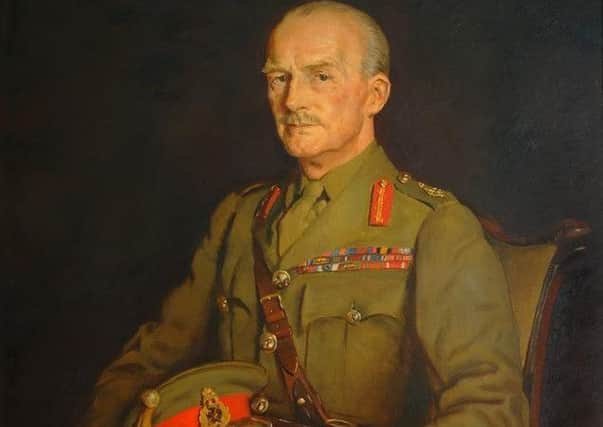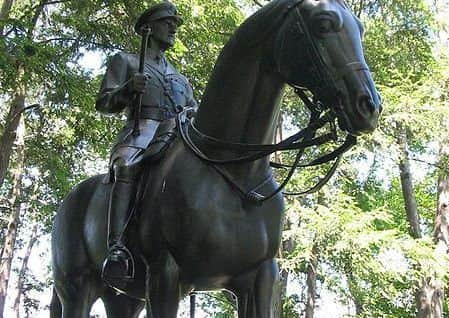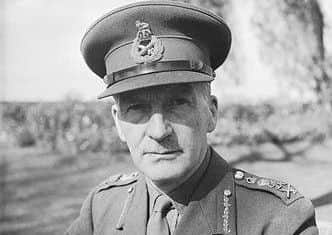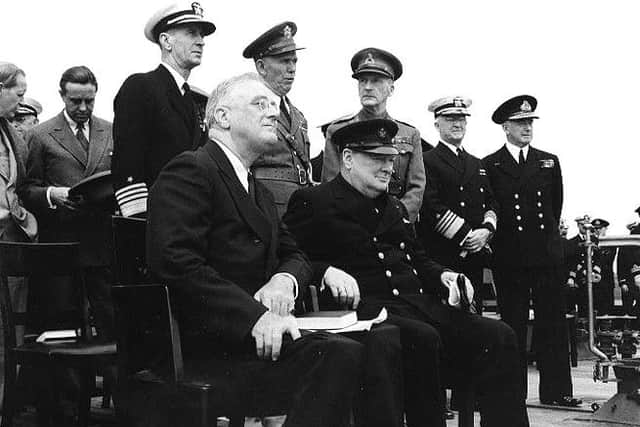Virtually unknown Ulsterman who oiled wheels of Allied WWII victory


John Greer Dill was born on Christmas Day 1881 in Lurgan, Co Armagh, the only son and second child of John and Jane Dill.
John Dill was the manager of the local branch of the Ulster Bank. Mrs Dill’s maiden name was Greer; hence the future field marshal’s second Christian name. Dill’s parents died within months of each other when he was 12.
Advertisement
Hide AdAdvertisement
Hide AdAn uncle, the Rev Joseph Grundy Burton, a Church of Ireland clergyman who became rector of St Elizabeth’s in Dundonald in 1922, assumed responsibility for the upbringing of the young Dill and his sister.


Dill was educated at Methodist College, Belfast, and Cheltenham College. The latter’s strong military tradition propelled him in the direction of an Army career.
Between the end of the Boer War and the outbreak of the Great War in August 1914, promotion in the peacetime army was painfully slow: Dill only became a captain in 1911. However, significantly, in August 1914 he was a student at the Staff College, Camberley, because Dill was beginning to exhibit the qualities that marked him out for a distinguished future.
Advertisement
Hide AdAdvertisement
Hide AdBy any standards, Dill had an exceptionally good war: he was wounded, awarded the DSO in 1915, the CMG in 1918, and was the recipient of various French and Belgian decorations, and mentioned in despatches eight times. He ended the war as a brigadier-general.


Although he enjoyed a rich and varied career in the inter-war years, for much of this period he was heavily involved in officer training. In 1926 he became an instructor at the new Imperial Staff College. In January 1931 he became a major general and was appointed commandant of the Staff College, Camberley.
Other appointments broadened his experience in these years. For example in 1934 he became director of military operations and intelligence at the War Office. In 1937 he was knighted.
At the outbreak of the Second World War, Dill was appointed to command the 1st British Corps, which was hastily despatched to France, and promoted to the rank of general in October 1939. His corps, stationed on the Belgian border, saw no action before he was recalled in April 1940 – just before the Phoney War became the Blitzkrieg – to become vice-chief of the Imperial General Staff (CIGS) in May 1940.
Advertisement
Hide AdAdvertisement
Hide AdLater the same month he then succeeded Field Marshal Sir Edmund Ironside as CIGS. It was Dill’s grave misfortune to preside over a disastrous period in British military history. He was forever haunted with the problem of husbanding scarce resources to meet so many commitments and the fear that the necessary resources would not be available when they were needed most.


This wreaked havoc with his health. He frequently failed to see eye-to-eye with Churchill, who unfairly nicknamed him ‘Dilly-Dally’.
Far from being indecisive, as Field Marshal Lord Carver has observed: ‘Dill allied a quick mind to a quiet manner, concealing a strong will’.
Churchill had many of the characteristics of a bully and a thug and, although Dill could and did stand up to Churchill, he was temperamentally ill-equipped to do so, unlike Alan Brooke, his successor.
Advertisement
Hide AdAdvertisement
Hide AdOf Brooke, Churchill observed: ‘When I thump the table and push my face towards him what does he do? Thumps the table harder and glares back at me – I know these Brookes, stiff-necked Ulstermen, and there’s no one worse to deal with than that.’ Unfortunately Dill was not an Ulsterman in this mould.


Suffering from stress and overwork, Dill retired as CIGS in December 1941, making way for Brooke. The pill was sweetened with promotion to field marshal and his appointment as governor-designate of Bombay.
Before Dill could take up the Indian appointment, the Japanese attack on Pearl Harbor intervened and the United States entered the war. In the aftermath of Pearl Harbor Churchill requested an immediate conference with Roosevelt and on December 12 Churchill set off for Washington, D.C., and over a three-week period (from December 22 1941 to January 14 1942) the two leaders hammered out a set of Anglo-American accords.
During a half-hour conversation in 10 Downing Street the day before Churchill and his party left for the United States, Brooke succeeded in persuading an extremely recalcitrant Churchill to take Dill with him. With justice, Brooke regarded this conversation as ‘one of the most important accomplishments during the war, or at any rate amongst those that bore most fruit’.
Advertisement
Hide AdAdvertisement
Hide AdDill had accompanied Churchill to Placentia Bay, Newfoundland, in August 1941 and had got on extremely well with George C Marshall, the US chief of staff. The ever astute Brooke fully appreciated the potential of this friendship.
Dill stayed on after the Arcadia Conference (Arcadia was the code name for the conference held in Washington between December 22 1941 and January 14 1942) to head the British joint chiefs of staff mission to Washington and to be the senior British representative on the combined British and US joint committee of the chiefs of staff and the representative of the minister of defence (ironically Churchill). Dill’s health improved and he soon became one of the crucial figures in cementing Anglo-American relations.
Field Marshal Lord Carver has described Dill’s contribution in the following terms: ‘Dill’s straightforward and tactful manner, his clear mind and keen intelligence, and his experience impressed the Americans … On many occasions he was able to find an agreed solution when deadlock between the British and American chiefs of staff appeared imminent.’


When Dill died on November 4 1944, Roosevelt said of him that he had been ‘the most important figure in the remarkable accord which has been developed in the combined operations of our two countries’. He was buried in Arlington National Cemetery, a unique distinction for a foreigner, and was posthumously awarded the Distinguished Service Medal.
Advertisement
Hide AdAdvertisement
Hide AdThe US joint chiefs of staff sent a remarkable message of condolence to their British counterparts, mourning the ‘loss to our combined war effort resulting from the death of Field Marshal Sir John Dill. His character and wisdom, his selfless devotion to the Allied cause, made his contribution to the combined British-American war effort of outstanding importance.
‘It is not too much to say that probably no other individual was more responsible for the achievement of complete co-operation in the work of the combined chiefs of staff ... We mourn with you the passing of a great and wise soldier and a great gentleman. His task in this war has been well done.’
In due course Dill was honoured with a magnificent equestrian statue in Arlington National Cemetery. However, while there are statues of Brooke and Montgomery in Whitehall, there is none of Dill. Dill’s vital role is rarely acknowledged or appreciated on this side of the Atlantic.
Primarily, the reason why Dill is a largely forgotten figure was Churchill’s inability to share Roosevelt’s justly high regard for the man and his achievement.
Yet, in Brooke’s estimation: ‘Few men did more in furthering our cause of final victory than Dill’.